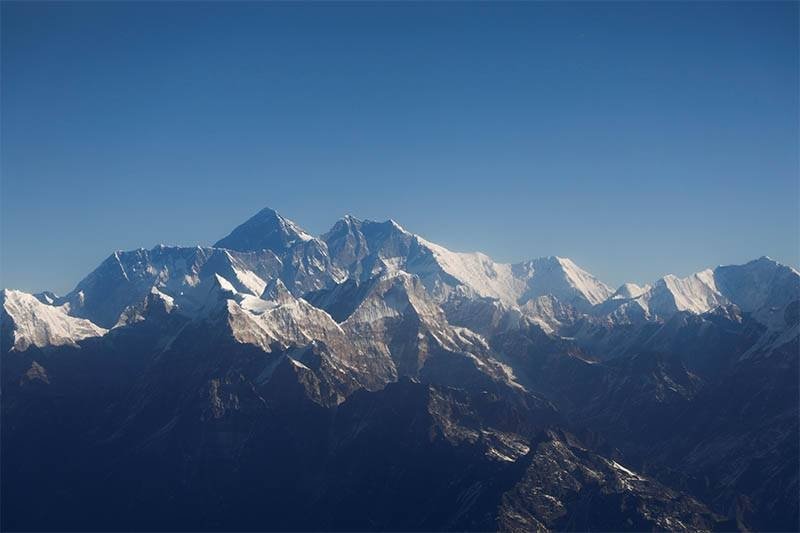
'Giver rest and respect to Everest'
Author: Bal Krishna Sah
Category: Mountain
June 4, 2025
Everest, Nepal
While Nepal is grappling with the impact of climate change on snow capped mountains, including Mount Everest, mountaineers and activists have called for giving respect and rest to Everest.
While Nepal is grappling with the impact of climate change on snow capped mountains, including Mount Everest, mountaineers and activists have called for giving respect and rest to Everest.
Famed Sherpa guide will attempt to climb Mount Everest for a 31st time and break his own record
UNESCO report paints bleak picture of climate change impacts on ecosystems
Kanchha Sherpa, the last surviving member of Everest 1953, the First Ascent of Mount Everest, stated in his biography 'Tough and Cheerful' by Patricia Moon that 'Everest needs a rest for a few seasons.'
He has also stated in interviews that the number of climbers should be reduced to avoid a swarm of people throwing tins and wrappings after eating food and littering Mt. Everest.
"They should not be dirtying the mountain. It is our biggest god, and they should not be dirtying the gods," Kanchha told the Associated Press during an interview. "Qomolangma is the biggest god for the Sherpas, but people smoke and eat meat and throw them on the mountain."
Recently, Purnima Shrestha, after successfully completing her fifth Everest summit and becoming the first woman to reach the summit three times in one season during a felicitation program hosted by UNDP stated, "Mountains have been commercialised and inexperienced mountaineers have polluted Mount Everest (Sagarmatha). The pain of Sagarmatha is also something very important that we must recognise."
She further said, "Mount Everest deserves dignity. Witnessing glaciers melt hurts me deeply. The number of ponds has increased dramatically as a result of glacier melting."
She emphasised that people in Sagarmatha are dying as a result of stubbornness and ego, despite being physically and mentally unfit. According to her, Everest faces an extreme level of traffic due to such activities.
"I think people are harming Sagarmatha immensely due to these activities. The death toll is rising because summiters are inadequately equipped and prepared," she added.
"Regulatory measures should be strictly enforced. The government has introduced some prerequisites. Unfortunately, they have not been implemented."
Bangladeshi mountaineer Ikramul Hasan Shakil, after successfully completing his Sea-to-Summit expedition covering 1,372 kilometres on foot from Inani Beach in Cox's Bazar to the summit of Mount Everest, with agendas to raise awareness about plastic pollution, sustainable living, and climate change, said single-use plastic has contaminated the sea and the mountains, polluting the fresh water stored in them.
"Thus, to raise wider awareness and educate people, and with a message to beat plastic pollution and save the planet, I climbed Everest," he said.
Moreover, Research aimed to identify and characterise the microplastic (MP) pollution near the top of the highest mountain on Earth and could illustrate the implications for the environment and the people. Stream water and snow collected from multiple locations leading up to, and including, the Balcony (8440 m.a.s.l.). MPs were detected at 30 MP per litre in snow and 1 MP/litre in stream water, and the majority were fibrous.
Subsequently, with increased tourism, especially the high mountain expeditions, the deposition of MP near Mt Everest is expected to rise. At a pivotal point in the exploration of remote areas, environmental stewardship should focus on technological and other advances towards minimising sources of MP pollution.
In 2024, a bench of Supreme Court judges Sapana Pradhan Malla and Sushma Lata Mathema issued an order on Public Interest Litigation (PIL) in the name of the government to 'prevent pollution, bring down the dead bodies in the mountains and bury them far away from the base camp, and fix the maximum number of climbers.'
Moreover, the Nepali Army removed 11,000 kg of waste from mountains, including Everest, Lhotse, and Nuptse, as part of their Mountain Clean-Up campaign in 2024, as well as four dead bodies and one human skeleton during its 55-day clean-up campaign duration.
Weather Update: Standard Himalayan mountain conditions
Peak Altitude: 8440 m
Risk Level: High
Expedition Info: Record-setting climbing expedition
Mountaineering
Himalayas
Nepal
Adventure Sports
Everest
Lhotse
Summit
Expedition
Base Camp
Ascent